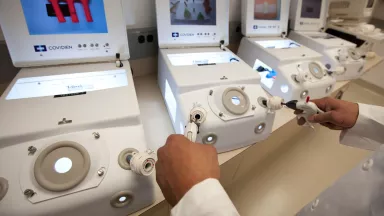Introduction
Our world-renowned orthopedic surgeons and orthopedists are experts in their fields with specialized training to provide the optimal diagnosis and treatment for a range of orthopedic conditions. We are internationally recognized for delivering the highest-quality orthopedic care to our patients.
What is the Achilles tendon?
The Achilles tendon connects the calf muscle to the heel bone. It lets you rise up on your toes and push off when you walk or run.
What are common Achilles tendon problems?
The two main problems are:
- Achilles tendinopathy
- Achilles tendon tear or rupture
Achilles tendinopathy refers to tiny tears (microtears) in the tissue in and around the tendon. These tears are caused by overuse. Achilles tendinopathy is also often called Achilles tendinitis.
An Achilles tendon also can partially tear or completely tear (rupture). A partial tear may cause mild or no symptoms. But a complete rupture causes pain and sudden loss of strength and movement.
Problems with the Achilles tendon may seem to happen suddenly, but usually they are the result of many tiny tears in the tendon that have happened over time.
Achilles tendinopathy is likely to occur in men older than 30. Most Achilles tendon ruptures occur in people 30 to 50 years old who are recreational athletes. Ruptures can also happen in older adults.
What causes Achilles tendon problems?
Achilles tendinopathy is most often caused by overuse or repeated movements during sports, work or other activities. For example, if you do a lot of pushing off or stop-and-go motions when you play sports, you can get microtears in the tendon.
Achilles tendon rupture is most often caused by a sudden, forceful motion that stresses the calf muscle. This can happen during an intense athletic activity or even during simple running or jumping. Middle-aged adults are especially likely to get this kind of injury.
What are the symptoms of Achilles tendon problems?
Symptoms of Achilles tendinopathy include swelling in the ankle area and mild or severe pain. The pain may come on gradually or may only occur when you walk or run. You may have less strength and range of movement in the ankle.
Symptoms of an Achilles tendon rupture may include a sudden, sharp pain. Most people feel or hear a pop at the same time. Swelling and bruising may occur. You may not be able to point your foot down or stand on your toes.
How are Achilles tendon problems diagnosed?
Your doctor can tell if you have an Achilles tendon problem by asking questions about your past health and checking the back of your leg for pain and swelling.
If your symptoms are severe or don’t improve with treatment, your doctor may want you to get an X-ray, ultrasound scan or MRI.
How are Achilles tendon problems treated?
Treatment for mild Achilles tendon problems includes rest, over-the-counter pain medicine and stretching exercises. You may need to wear well-cushioned shoes and change the way you play sports so that you reduce stress on the tendon. Early treatment works best and can help prevent more injury. Orthotic shoe devices can also help reduce stress on the tendon.
Even in mild cases, it can take weeks to months of rest for the tendon to repair itself. It’s important to be patient and not return too soon to sports and activities that stress the tendon.
Treatment for severe problems, such as a torn or ruptured tendon, may include surgery or a cast, splint, brace, walking boot or other device that keeps the lower leg and ankle from moving. Exercise, either in physical therapy or a rehab program, can help the lower leg and ankle get strong and flexible again. The tendon will take weeks to months to heal.
Although treatment for Achilles tendon problems takes time, it usually works. Most people can return to sports and other activities.
Physician Referrals
Montefiore Einstein embraces a collaborative approach.
If you have a patient who could benefit from our services, please reach out.
718-920-2060
Schedule a Visit
Have a general question or concern?
We’re available to help you by phone or email.
• 718-920-2060 • orthofeedback@montefiore.org






